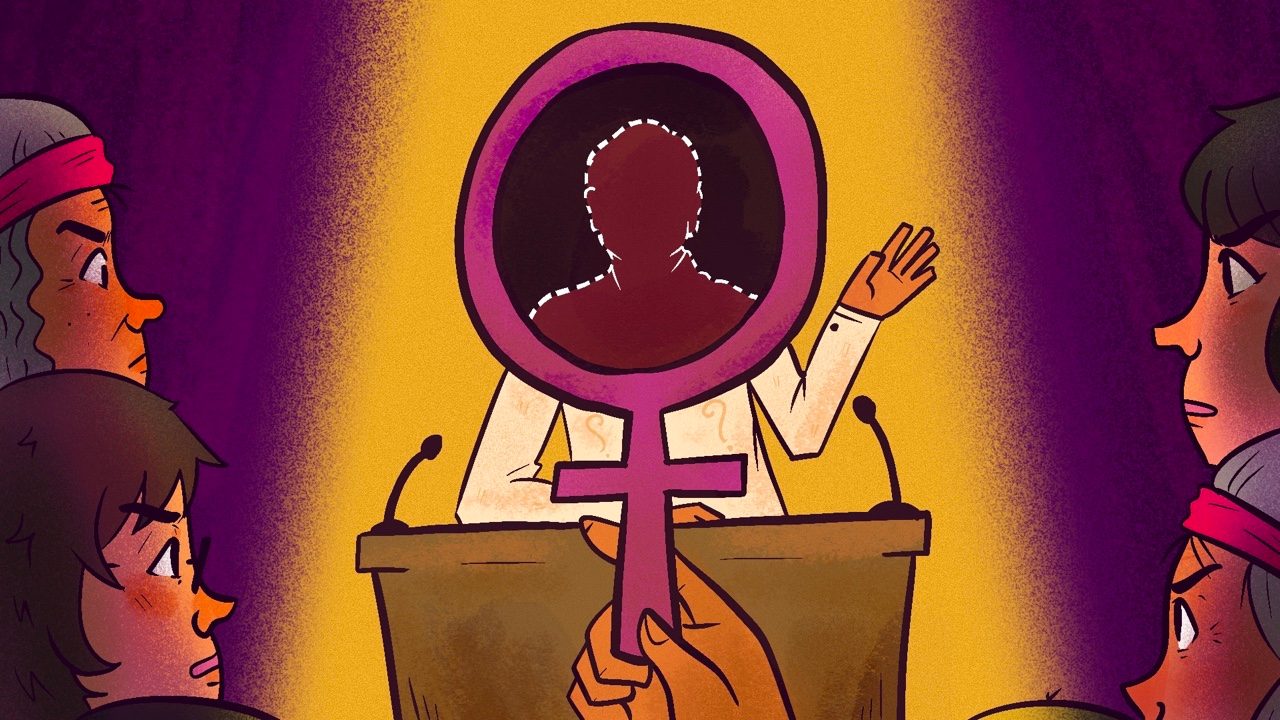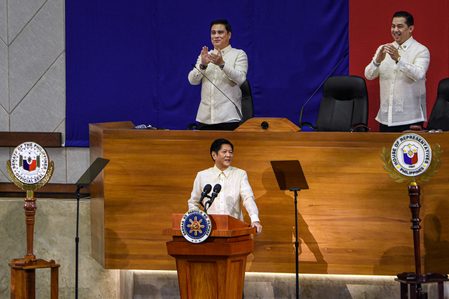SUMMARY
This is AI generated summarization, which may have errors. For context, always refer to the full article.

MANILA, Philippines – When President Ferdinand “Bongbong” Marcos Jr. was running for president in 2022, some feminists who were looking for progressive positions among the candidates were pleasantly surprised.
In an interview with television host Boy Abunda during the 2022 election period, Marcos was quick to say he was for the enactment of an abortion law for “very severe cases.”
“For me, the bottomline is when it comes to the subject of abortion, it is a woman’s decision, because it is her body. There are some unusual cases where rape victims keep their child and raise them as their own. Again, they must be given a choice,” Marcos said.
In other engagements, Marcos said “there are cases where divorce is called for.” The Philippines remains the only state in the world apart from the Vatican to not have divorce. In previous years, he voted “yes” to the reproductive health bill as senator in 2012, and in 2016 said he had nothing against same-sex marriage if Congress approved a bill for it.
During the Philippine celebration of International Women’s Day on March 8 – Marcos’ first as president – Philippine Commission on Women (PCW) deputy executive director Maria Kristine Balmes said that Marcos supported pro-woman laws through the Presidential Legislative Liaison Office.
“In the Philippines, we recognize the important role of women in national development. And that is why we strive to invest in women and enact laws that provide them equal opportunity and allow the nation the full benefit of their participation and their contribution,” Marcos said in his recorded message in the PCW-organized event.
Marcos has shown he is a politician with progressive views, issuing statements that appear to be respectful of women. It is a far cry from his predecessor Rodrigo Duterte’s consistent and unapologetic sexist remarks uttered throughout his term. Some advocates and experts say that it contributed to a normalization of misogyny emanating from no less than the presidential seat.
But almost a year into his presidency, women’s rights advocates are wondering where Marcos’ follow-through is, especially since gender-related laws were missing from his State of the Nation Address priority bills.
With the administration’s priorities lying elsewhere, advocates have said that affirmative stances on women’s rights aren’t enough to catalyze actual policies. Marcos also faces the challenge of undoing the cultural effects of Duterte’s misogyny.
The president’s influence
Sylvia “Guy” Claudio, former dean of the University of the Philippines (UP) Diliman’s College of Social Work and Community Development, noticed differences in how women’s issues were addressed among different administrations.
“It’s funny because it doesn’t necessarily mean that if it’s a woman president, the women’s issues are better handled,” said Claudio, who has continuously engaged in the women’s movement for around 40 years. To illustrate, she pointed to how reproductive health rights were handled in some previous administrations. A prominent source of resistance has always been the Catholic church – the religion of most Filipinos.
Under late dictator Ferdinand E. Marcos, the President’s father, there were accessible family planning programs. But these put an emphasis on population control rather than a woman’s choice to use, or not use, contraceptives.
“There was this push to sort of limit the number of children women were giving birth to. You mix that idea with this authoritarian regime, and what you were getting was women were being forced into contraceptives they didn’t like or want to have,” said Claudio.
Reproductive rights violations were documented during this time, such as women getting intrauterine devices (IUDs) inserted without their prior knowledge, or being intimidated in barangay health centers to take birth control pills.
When democracy icon Corazon Aquino succeeded the Marcos dictatorship in 1986, tables turned completely due to Aquino’s devout Catholicism. Reproductive health services were deemphasized, and women’s and health groups blocked an effort to ban all forms of artificial contraception. It took three years before Aquino announced that multiple methods of family planning (FP) would be promoted.
As for the next female presidency, Claudio said Gloria Macapagal-Arroyo found herself trading off with the Catholic church on women’s issues “in order for her to survive the many scandals that rocked her administration.”
“[Arroyo] would say things against abortion and she would follow the church’s line of abortion…. And she used all her power with Congress to stop that bill from passing. So Gloria Macapagal-Arroyo, in my mind, is like Cory, two women presidents that we’ve had, who did not really do much for reproductive health,” she said.
It took Benigno Aquino III, a man, to muster political capital to push for the passage of the reproductive health law of 2012. Despite staunch opposition from religious groups, the late former president was able to get it done.

Dealing with Duterte
Like previous administrations, several policies for women’s and children’s rights were passed under Duterte. These included the Safe Spaces Act, setting a higher age of sexual consent, and the banning of child marriages.
But Joie Cortina, one of the co-founders of the Young Feminists Collective, noted that these were wins of the advocates who pushed for such policies and found allies in Congress.
“I don’t think that those legislative wins are entirely attributable to him. And these laws have been in the legislative mills for so long. The advocates worked on those. It’s the victory of community-based actors,” said Cortina.
Duterte had a strong hold on Congress, as lawmakers swiftly supported or passed whatever he deemed a priority. Some of these included controversial measures like the reinstatement of the death penalty, the lowering of the minimum age of criminal responsibility, and the anti-terrorism law.
Cortina noted the challenge in dealing with lawmakers whom they “would not otherwise work with” for the sake of rallying support for women’s bills.
“It’s difficult because you have to connect with people whom you can’t stand, who really supported, who really enabled Duterte around that time…. It’s tricky because they’re supporting, for example, the repositioning of the death penalty and other similar laws that are running counter to our thrust of advancing human rights,” she said.
Apart from Duterte’s sexist remarks, Claudio noted the gendered effects of Duterte’s top priority – his deadly war on drugs. The drug war saw thousands of vigilante-style, extrajudicial killings that prompted the International Criminal Court to open an investigation.
“The people who are left behind are generally women and their children who then have to fend for themselves. And because of his stigmatization of drug addicts, and the fear that if you get associated with anyone who has been killed in the drug war, you, too, might be putting yourself in danger,” said Claudio.
Marcos, the ‘gentleman’
In his nine months as president, Marcos has not shown overt signs of machismo, nor has he made, so far, any public pronouncement perceived to be misogynistic.
“Ferdinand ‘Bongbong’ Marcos is a gentleman,” said Bataan 1st District Representative Geraldine Roman, the first Philippine transgender congresswoman, in the March 8 PCW event’s press conference. She was responding to a question from Rappler on how the Marcos administration could undo the effects of Duterte’s misogyny.
Roman continued, “From that, we take our cue in Congress and push forward women’s rights legislation. To cite a few, we already have approved at the committee level – we expanded the protection of women and their children against electronic violence, because this is an amendment to our existing anti-violence law.”
Despite Marcos being seen to be more of a feminist compared to Duterte, Cortina and Claudio said this is not enough to translate to women’s rights victories during his term.
“It’s easy to say things. But are they priority bills in Congress? I don’t see it,” said Claudio. She highlighted the administration’s current emphasis on the controversial Maharlika wealth fund, and the alleged delaying tactics of the SOGIE equality bill, a measure that seeks to penalize discrimination based on sexual orientation, gender identity, and gender expression (SOGIE).
“It’s better than Duterte in the sense that at least there’s no malevolent active hatred and intimidation. But it certainly is a far cry from other administrations where there was a positive energy in pushing for women’s rights and betterment,” said Claudio.
Cortina made the same point: “It’s easy to say that you’re pro-abortion, and pro-marriage equality and all those things. But what about the strategy? What about the steps that you take?”
When Marcos explained his stance on abortion in Abunda’s interview, the TV host followed up with how his views were contrary to the opinion of the Catholic church that largely frowns upon abortion.
Marcos replied by saying that he could not “argue theology,” but only base his views on statistics Abunda had cited while asking the question. According to Abunda, data from the Philippine Safe Abortion Advocacy Network showed there were thousands of maternal deaths due to unsafe abortion complications. The Philippines remains to have a highly restrictive law against abortion.
“We want to save the lives of people. We want to save the lives of women…. As a public administrator and as a public servant, what you are looking to [do] is to avoid all of these tragedies. Every single one of these statistics that you’ve read is a tragedy in itself. It affects the woman involved, it affects the entire family, generally it affects the community, it affects them for the rest of their lives,” said Marcos.
Some politicians – especially when they want to win over the support of conservatives – tend to be cautious about being too progressive in their public pronouncements. Cortina said former vice president Leni Robredo was an example, who, being a devout Catholic with conservative yet nuanced views, risked losing the support of key groups in her presidential run.
Meanwhile, Nathalie Africa-Verceles, former director of the UP Center for Women’s and Gender Studies, believes that Marcos was confident he would still have their votes regardless of what he said.
“It was very telling that he did not care what the conservatives would say. He knew it would not affect him, perhaps. You would not brazenly do something that he knew would affect his chances for the presidency. So that means he knew that he had the mandate and he would have the mandate,” said Verceles.
Marcos enjoyed an overwhelming majority vote in pre-election surveys, which translated into eventual victory with 31 million votes.
Marcos’ popularity as opportunity
Like Duterte, Marcos has a lot of allies in the legislative branch who would throw their support behind any measure he deems a priority.
“We hope that he will really, really go all out. All it takes is an order from Malacañang to get all these legislators voting the right way or the way we want them to, right?” said Verceles.
Verceles also said that one way Marcos could follow through with his pro-woman stances is to be more vocal about them, as Filipinos tend to be “so attuned with what our presidents say,” and such statements can have policy implications. This may not necessarily be through formal pronouncements about legislation alone, but just being more candid about his views, she said.
“The message [in the Abunda interview] was so clear – it was really ‘respect women’s body autonomy.’ I mean, that was something. In other words, that wasn’t contrived. I saw it as something that was very spontaneous. So we hope that he’ll continue to do that, because he’s approaching a full year in the presidency,” said Verceles.
Marcos also has an opportunity to influence progressive views with his millions of supporters across the country. Verceles even pointed to the potential of his disinformation networks to spread ideas that could be helpful for the women’s rights agenda.
“He has a cult following. Imagine being able to influence all those people, millions and millions of people who have put their faith, their trust, their confidence in you,” she said.
“The reach of those [troll] farms is incredible. That’s why he won. So perhaps through his social media, we can influence that machinery that put him into power. How do we utilize that? Because for the most part, that’s information-based,” Verceles added, noting though that this could be wishful thinking.
Claudio mentioned a long list of things Marcos could do to prove his commitment to feminist causes: fully implementing the reproductive health law, holding continuous trainings for barangay committees and security forces on violence against women, reexamining unconditional cash transfers for certain sectors like women in agriculture, emphasizing the protection of women migrant workers, fully integrating gender issues in all sectors of development plans, and freeing detained former opposition senator Leila de Lima, among others.
Regardless of what Marcos does, the women’s rights movement will continue to work towards advancing women’s rights without depending on the chief executive’s cues.
Cortina and Verceles emphasized the importance of localizing the implementation of women and gender policies, which nongovernment organizations and civil society groups can push on their own.
“If you could have a provincial level implementation team of a law, that would be nice. Even as micro, as a barangay level implementation team. I remember when we were part of the campaign to pass the Safe Spaces Act, it actually started with this random fashion show in the middle of Taft Avenue to convince local legislators to have an ordinance, a safe space ordinance. So, the strategies differ. Sometimes you start with the local champions. You create traction around a specific issue,” said Cortina.
“We continue to do our work, whoever is there as president. We find entry points…. We’ll maximize it. But that’s not going to determine how we’re going to work,” said Verceles. – Rappler.com
Add a comment
How does this make you feel?


![[VIDEO EDITORIAL] Goodbye Duterte, hello Marcos](https://www.rappler.com/tachyon/2022/06/animated-duterte-marcos-transition-2.jpg?resize=257%2C257&crop=223px%2C0px%2C720px%2C720px)
![[EDITORIAL] Goodbye Duterte, hello Marcos](https://www.rappler.com/tachyon/2022/06/animated-duterte-marcos-transition-carousel.jpg?resize=257%2C257&crop_strategy=attention)

![[Dash of SAS] Women who benefit from Duterte’s sexism](https://www.rappler.com/tachyon/2021/04/tl-women-benefit-duterte-sexism-sq.jpg?resize=257%2C257&crop_strategy=attention)



![[Just Saying] SONA 2024: Some disturbing points](https://www.rappler.com/tachyon/2024/07/TL-marcos-sona-points-july-23-2024.jpg?resize=257%2C257&crop=335px%2C0px%2C720px%2C720px)

There are no comments yet. Add your comment to start the conversation.